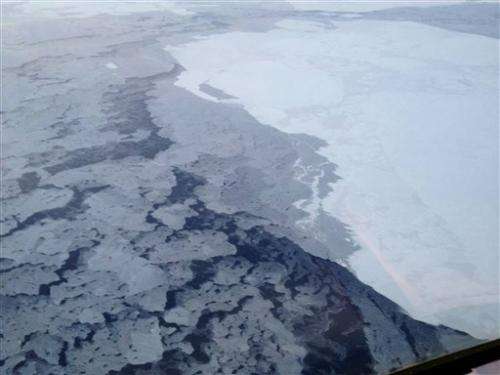Study: Arctic getting darker, making Earth warmer

The Arctic isn't nearly as bright and white as it used to be because of more ice melting in the ocean, and that's turning out to be a global problem, a new study says.
With more dark, open water in the summer, less of the sun's heat is reflected back into space. So the entire Earth is absorbing more heat than expected, according to a study published Monday in the Proceedings of the National Academy of Sciences.
That extra absorbed energy is so big that it measures about one-quarter of the entire heat-trapping effect of carbon dioxide, said the study's lead author, Ian Eisenman, a climate scientist at the Scripps Institution of Oceanography in California.
The Arctic grew 8 percent darker between 1979 and 2011, Eisenman found, measuring how much sunlight is reflected back into space.
"Basically, it means more warming," Eisenman said in an interview.
The North Pole region is an ocean that mostly is crusted at the top with ice that shrinks in the summer and grows back in the fall. At its peak melt in September, the ice has shrunk on average by nearly 35,000 square miles (90,650 sq. kilometers)—about the size of Maine—per year since 1979.
Snow-covered ice reflects several times more heat than dark, open ocean, which replaces the ice when it melts, Eisenman said.
As more summer sunlight dumps into the ocean, the water gets warmer, and it takes longer for ice to form again in the fall, Jason Box of the Geological Survey of Denmark and Greenland said in an email. He was not part of the study.
While earlier studies used computer models, Eisenman said his is the first to use satellite measurements to gauge sunlight reflection and to take into account cloud cover. The results show the darkening is as much as two to three times bigger than previous estimates, he said.
Box and University of Colorado ice scientist Waleed Abdalati, who was not part of the research, called the work important in understanding how much heat is getting trapped on Earth.
More information: "Observational determination of albedo decrease caused by vanishing Arctic sea ice," by Kristina Pistone, Ian Eisenman, and Veerabhadran Ramanathan. PNAS, www.pnas.org/cgi/doi/10.1073/pnas.1318201111
Journal information: Proceedings of the National Academy of Sciences
© 2014 The Associated Press. All rights reserved.
















